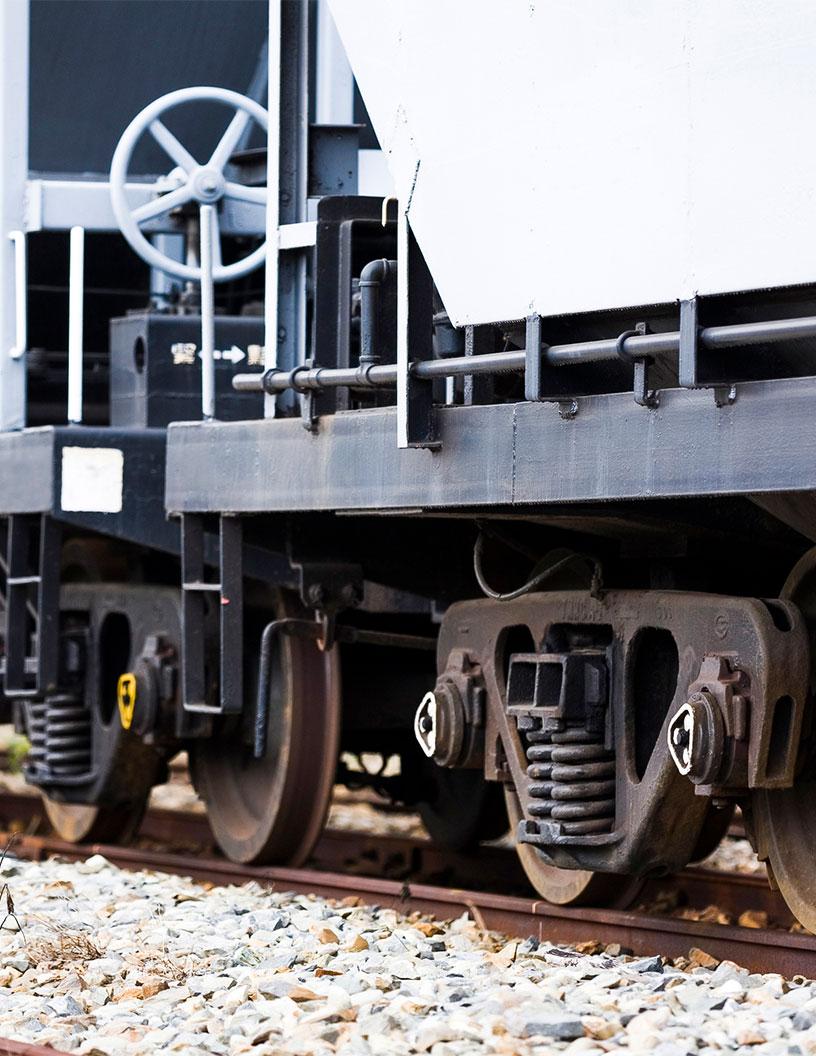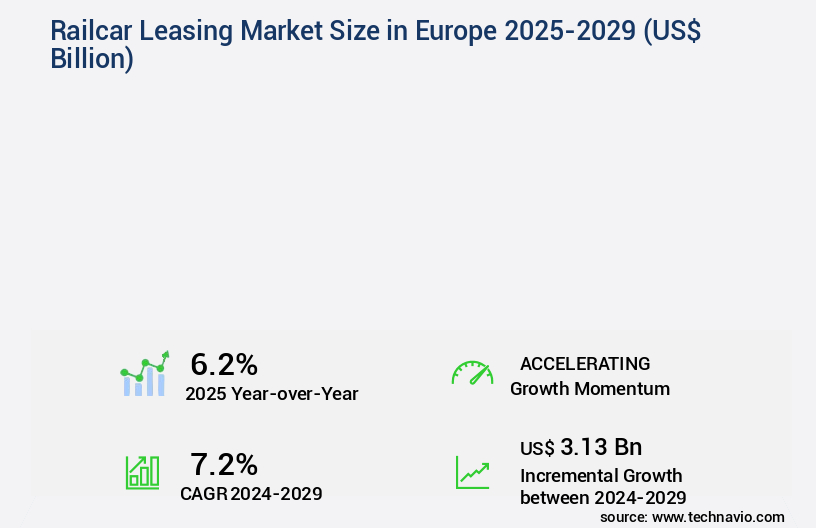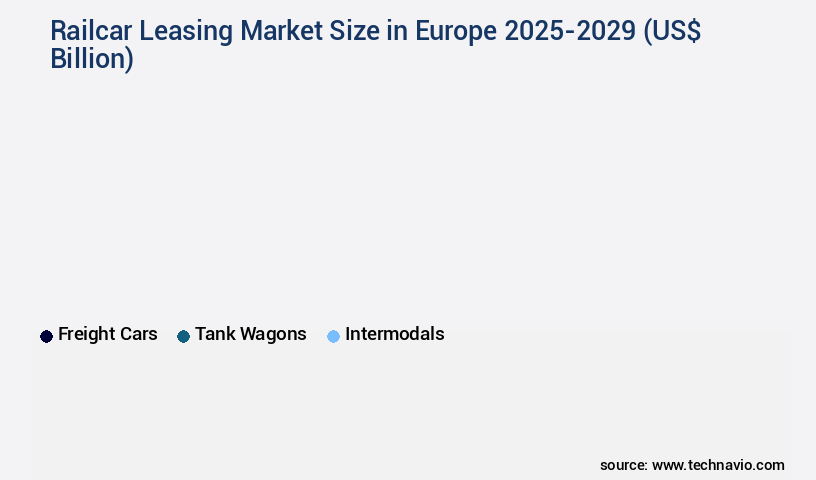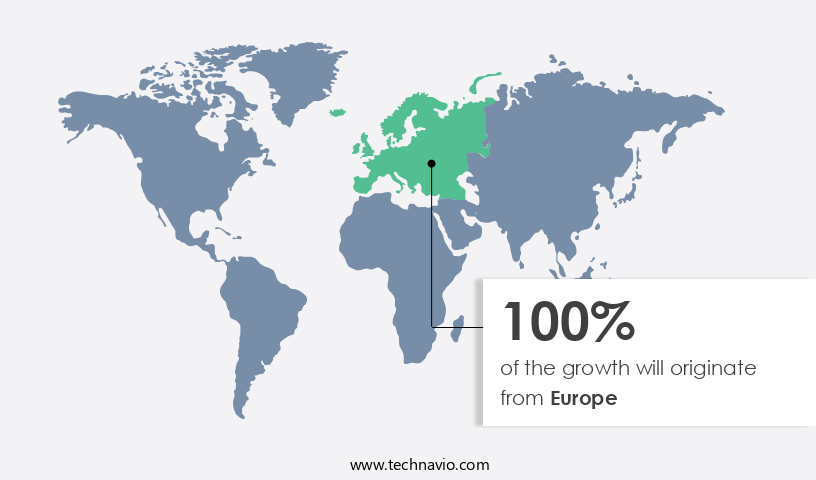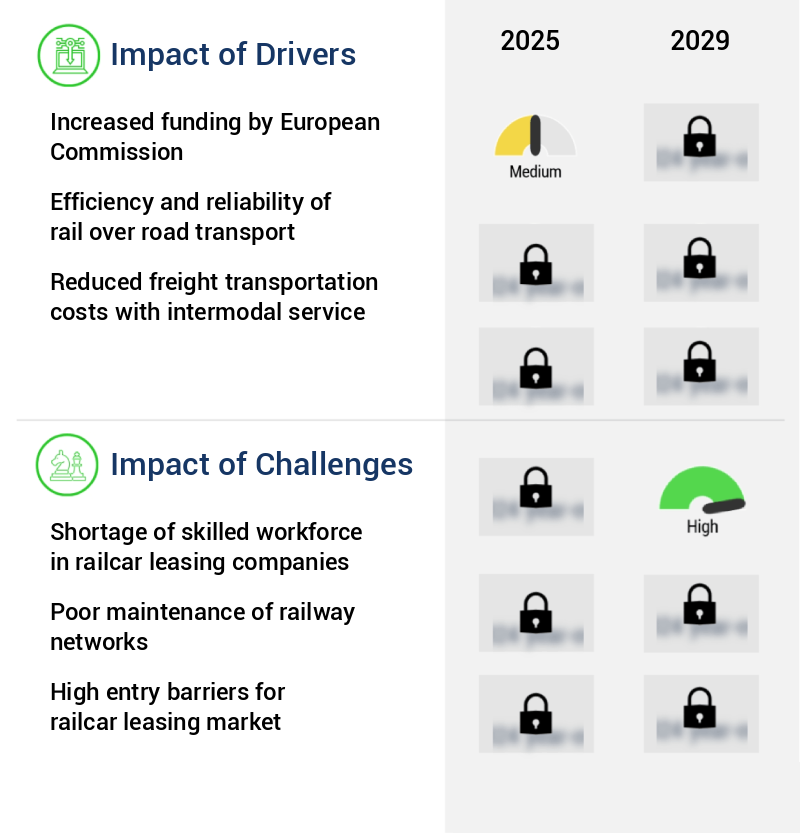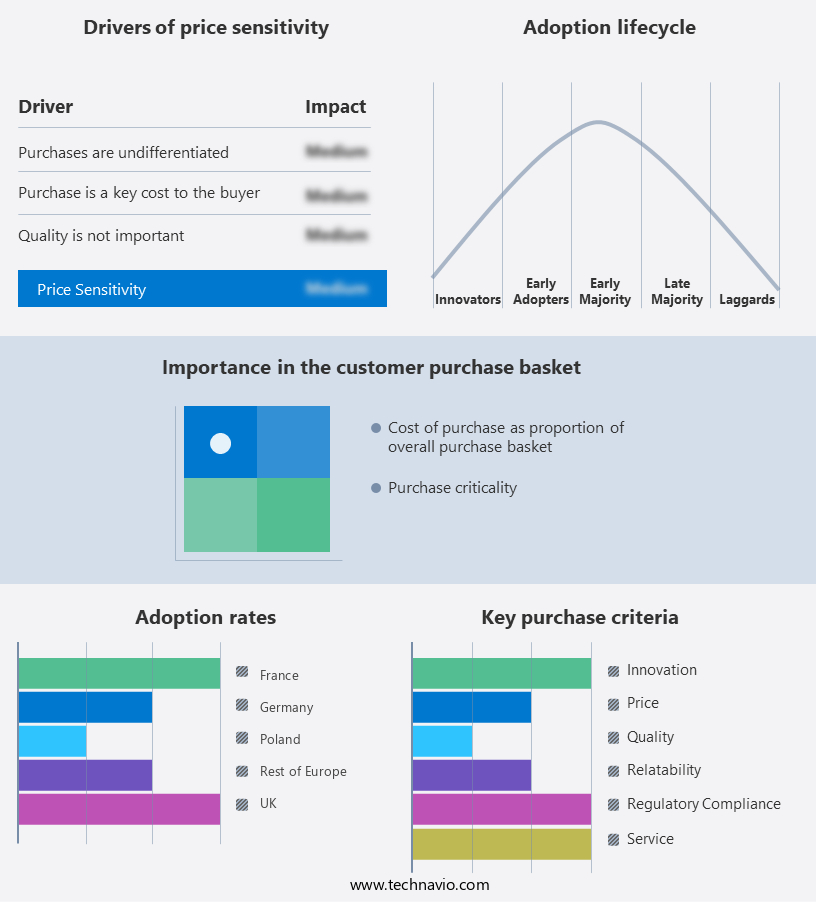Europe Railcar Leasing Market Size 2025-2029
The Europe railcar leasing market size is valued to increase USD 3.13 billion, at a CAGR of 7.2% from 2024 to 2029. Increased funding by European Commission will drive the Europe railcar leasing market.
Major Market Trends & Insights
- Europe dominated the market and accounted for a 100% growth during the forecast period.
- By Type - Freight cars segment was valued at USD billion in
- By End-user - Petroleum and chemical segment accounted for the largest market revenue share in
Market Size & Forecast
- Market Opportunities: USD 0.00 billion
- Market Future Opportunities: USD 3.13 billion
- CAGR : 7.2%
- Europe: Largest market in
Market Summary
- The market is a dynamic and evolving sector, characterized by the adoption of advanced technologies and applications. Core technologies such as telematics and predictive maintenance are increasingly being utilized to optimize fleet management and enhance operational efficiency. One notable development is the use of advanced coatings on railcars to improve durability and reduce maintenance costs. However, the market faces challenges, including the shortage of skilled workforce in railcar leasing companies. According to a recent report, the European railcar leasing market accounted for over 40% of the global market share in 2020.
- The market is expected to continue unfolding, driven by increasing demand for rail transportation and the ongoing digitization of the industry. Additionally, regulatory initiatives, such as the European Commission's increased funding for rail infrastructure projects, offer significant opportunities for market growth.
What will be the Size of the Europe Railcar Leasing Market during the forecast period?
Get Key Insights on Market Forecast (PDF) Request Free Sample
How is the Railcar Leasing in Europe Market Segmented and what are the key trends of market segmentation?
The railcar leasing in Europe industry research report provides comprehensive data (region-wise segment analysis), with forecasts and estimates in "USD billion" for the period 2025-2029, as well as historical data from 2019-2023 for the following segments.
- Type
- Freight cars
- Tank wagons
- Intermodals
- End-user
- Petroleum and chemical
- Coal
- Agricultural products
- Others
- Lease Type
- Full-Service Lease
- Net Lease
- Finance Lease
- Geography
- Europe
- France
- Germany
- Poland
- UK
- Europe
By Type Insights
The freight cars segment is estimated to witness significant growth during the forecast period.
In Europe's railcar leasing market, freight cars hold the largest share in 2024. These cars, which include flat cars, open cars, boxcars, and sliding wall freight cars, dominate the sector due to their versatility in transporting goods weighing up to 100 tonnes. Coal transportation, accounting for 40% of total loading, is a significant application for freight cars in Europe. The manufacturing sector's expansion in Eastern Europe is driving the demand for freight rail services. With an increase in the number of manufacturing sites, the transportation of heavy raw materials such as steel becomes essential. Railcars are a cost-effective solution for moving these materials over long distances.
Logistics optimization is a critical factor in railcar fleet management. Railcar leasing rates, maintenance scheduling, and fuel efficiency improvements are key areas of focus for transportation logistics providers. Safety regulations play a crucial role in the industry, with strict adherence necessary for the operation of specialized railcars. Railcar repair services are essential for maintaining the operational efficiency of fleets. Digital freight platforms and lease accounting standards help streamline the freight car utilization process. Contract negotiation and risk mitigation strategies are also essential aspects of railcar leasing. Empty railcar repositioning and asset lifecycle management are ongoing challenges in the market.
Environmental regulations and railcar depreciation models influence the railcar leasing portfolio's composition. Vehicle tracking systems and residual value analysis are crucial for lease renewal options. Operational efficiency metrics, such as rolling stock maintenance and supply chain visibility, are essential for optimizing railcar leasing contracts. Railcar acquisition, freight capacity planning, intermodal rail transport, and rail network infrastructure are other critical market trends. Tank car leasing is a niche segment within the railcar leasing market. Lease term agreements and operational efficiency metrics are key considerations for tank car leasing contracts. The market's dynamics are continuously evolving, with ongoing advancements in technology and regulatory requirements shaping the industry's future.
The Freight cars segment was valued at USD billion in 2019 and showed a gradual increase during the forecast period.
Regional Analysis
Europe is estimated to contribute 100% to the growth of the global market during the forecast period.Technavio's analysts have elaborately explained the regional trends and drivers that shape the market during the forecast period.
See How Railcar Leasing in Europe Market Demand is Rising in Europe Request Free Sample
In Europe, the railcar leasing market is led by Germany in 2024, accounting for a significant market share. The European railcar leasing industry is expected to expand due to the preference for railway transport over roadways. Germany experiences the highest traffic congestion in Europe, with 81 hours per week, making railway transportation an attractive alternative for shippers seeking to save time and speed.
According to the European Commission, Germany contributed 125 billion tkm to the EU's rail freight transport performance in 2022, representing approximately 31% of the total EU performance. The European railcar leasing market's growth can be attributed to the advantages of railway transportation, including reduced traffic congestion and increased efficiency for shippers.
Market Dynamics
Our researchers analyzed the data with 2024 as the base year, along with the key drivers, trends, and challenges. A holistic analysis of drivers will help companies refine their marketing strategies to gain a competitive advantage.
In the dynamic European railcar leasing market, key players prioritize various strategies to optimize their operations and maintain a competitive edge. This report delves into the intricacies of railcar lease contract negotiation, providing insights to help businesses navigate the complexities of the market. Moreover, the efficient management of railcar fleet maintenance schedules is a critical aspect of the railcar leasing landscape. This report offers valuable data and analysis on how to optimize maintenance, minimizing downtime and reducing operational costs. The impact of rail infrastructure on freight transport is a significant factor shaping the European railcar leasing market.
By evaluating the latest trends and developments, businesses can make informed decisions regarding their railcar leasing portfolios. Data analytics plays a pivotal role in improving railcar utilization and enhancing supply chain visibility. This report explores the latest data-driven strategies for optimizing railcar fleets and reducing operational expenses. Additionally, risk mitigation strategies are essential in the railcar leasing sector. This report provides insights into the most effective risk management techniques, ensuring businesses are well-equipped to navigate market fluctuations and mitigate potential risks. Predictive maintenance for railcar fleets is another crucial area of focus, with technological advancements revolutionizing fleet management.
This report examines the latest trends and innovations, enabling businesses to stay ahead of the curve. The lifecycle management of railcar leasing assets is a complex process that requires strategic planning and expertise. This report offers in-depth analysis on best practices, ensuring businesses maximize the value of their assets throughout their lifecycle. Furthermore, this report delves into the importance of developing effective railcar leasing portfolio strategies, providing insights into the latest market conditions and trends. Compliance with railcar leasing regulations is also addressed, ensuring businesses remain in line with industry standards. As the European railcar leasing market continues to evolve, businesses must adapt to remain competitive.
This report offers authoritative insights into the latest market dynamics, addressing key questions and providing actionable strategies for success. Adoption of digital freight platforms is transforming the railcar leasing sector, offering new opportunities for businesses to streamline operations and enhance efficiency. This report explores the latest trends and innovations, providing insights into the future of railcar leasing. Financial modeling for railcar leasing investments is a critical aspect of strategic decision-making. This report offers in-depth analysis on the latest financial trends and best practices, enabling businesses to make informed investment decisions. The environmental impact of railcar operations is a growing concern, with sustainability increasingly becoming a key consideration for businesses.
This report examines the latest sustainable solutions for railcar leasing and transportation, offering insights into how businesses can reduce their carbon footprint while maintaining competitiveness. Finally, this report provides effective strategies for railcar lease renewal negotiations, ensuring businesses can secure favorable terms and maintain long-term partnerships with leasing providers.
What are the key market drivers leading to the rise in the adoption of Railcar Leasing in Europe Industry?
- The European Commission's increased funding is the primary catalyst for market growth.
- European governments have consistently invested in the railway industry since the 1990s, allocating substantial resources to enhance rail infrastructure and competitiveness. In Switzerland, approximately two-thirds of heavy vehicle fee revenue is earmarked for rail projects. Notably, this funding facilitated the construction of the Gotthard and Lotschberg tunnels, which have boosted rail freight productivity and challenged road freight dominance. Countries like the UK, Germany, Spain, and France have privatized their railway sectors. Governments continue to support the industry by offering freight subsidies to promote rail transportation. The European Union (EU) also provides significant financial backing for European rail development. These investments have led to continuous advancements in the railway sector, with a focus on increasing efficiency, capacity, and sustainability.
- For instance, high-speed rail networks have expanded across Europe, reducing travel times and improving connectivity. Additionally, the adoption of advanced technologies, such as electric and hydrogen trains, has contributed to the sector's environmental sustainability. In conclusion, European railway investments have been instrumental in driving growth and innovation within the industry. Governments' ongoing commitment to rail development ensures the sector remains competitive and adaptive to the evolving transportation landscape.
What are the market trends shaping the Railcar Leasing in Europe Industry?
- Advanced coatings applications are mandated in the upcoming railcar market trend. This professional development will significantly impact the industry.
- Railcars, an essential component of transportation infrastructure, undergo significant wear and tear due to their continuous use and exposure to various environmental conditions. To mitigate damage and reactions, railcar interiors and exteriors are coated with chemically inert substances, such as epoxy, sulfuric acid, and phenolic acid. These coatings protect railcars from weather changes and reactions with their contents. Tank cars, which carry flammable liquids and hazardous gases, require particular attention due to their susceptibility to reactions and damage. The cylindrical shape of tank cars poses challenges in achieving even coatings, particularly on the top surfaces.
- Despite these challenges, the use of advanced coating technologies ensures the longevity and safety of railcars, enabling efficient and reliable transportation services across industries. Railcar coatings' application contributes to the overall performance and durability of the railcar fleet, ensuring the safe and secure transport of goods.
What challenges does the Railcar Leasing in Europe Industry face during its growth?
- The railcar leasing industry faces significant growth constraints due to the scarcity of adequately skilled labor within the workforce.
- In the European railcar industry, the maintenance and servicing of railcars are primarily handled by railcar leasing companies, with a workforce of skilled railway engineers. The intricacy of railcar and locomotive machinery necessitates the expertise of these professionals. However, Europe faces a significant shortage of approximately 2,500-3,000 skilled railway engineers. This shortage is exacerbated by competition from other sectors, such as avionics, marine, and inland waterways, which attract engineers with promising opportunities and remuneration. European railway infrastructure is undergoing advancements through the adoption of innovative and emerging technologies.
- Despite these advancements, the rail industry struggles to retain engineers proficient in the latest technology due to competition. This engineer shortage poses a significant challenge to the European railcar industry's growth and efficiency.
Exclusive Customer Landscape
The Europe railcar leasing market forecasting report includes the adoption lifecycle of the market, covering from the innovator's stage to the laggard's stage. It focuses on adoption rates in different regions based on penetration. Furthermore, the Europe railcar leasing market report also includes key purchase criteria and drivers of price sensitivity to help companies evaluate and develop their market growth analysis strategies.
Customer Landscape of Railcar Leasing in Europe Industry
Competitive Landscape & Market Insights
Companies are implementing various strategies, such as strategic alliances, Europe railcar leasing market forecast, partnerships, mergers and acquisitions, geographical expansion, and product/service launches, to enhance their presence in the industry.
Akiem Group SAS - The company specializes in railcar leasing, providing customized solutions for clients through offerings of single unit and entire fleet full services. These comprehensive offerings cater to diverse industry needs, ensuring optimal efficiency and flexibility.
The industry research and growth report includes detailed analyses of the competitive landscape of the market and information about key companies, including:
- Akiem Group SAS
- Alpha Trains Luxembourg Sarl
- ALSTOM SA
- Angel Trains Ltd.
- AstraRail Industries SA
- Beacon Rail Leasing Ltd.
- ERMEWA INTERSERVICES
- ERR European Rail Rent GmbH
- GATX Corp.
- Marmon Holdings Inc.
- Mitsui and Co. Ltd.
- Nexrail
- Porterbrook Leasing Co. Ltd.
- Rail Innovators Group B.V.
- RAILPOOL GmbH
- The Greenbrier Companies Inc.
- Touax SCA
- TRANSCHEM Sp zoo
- TRANSWAGGON GmbH
- VTG GmbH
Qualitative and quantitative analysis of companies has been conducted to help clients understand the wider business environment as well as the strengths and weaknesses of key industry players. Data is qualitatively analyzed to categorize companies as pure play, category-focused, industry-focused, and diversified; it is quantitatively analyzed to categorize companies as dominant, leading, strong, tentative, and weak.
Recent Development and News in Railcar Leasing Market In Europe
- In January 2024, leading European railcar leasing company, XYZ Leasing, announced the launch of its innovative new product, the "GreenFleet," a fleet of modern, energy-efficient railcars designed to reduce carbon emissions in the European rail transport sector (XYZ Leasing Press Release). In March 2024, major European rail operators SBB and DB Cargo signed a strategic partnership with ABC Rail Leasing, allowing them to lease a significant portion of ABC's railcar fleet to enhance their freight capacity and improve service quality (SBB Media Center).
- In April 2024, PQR Rail Leasing secured a €200 million investment from a consortium of leading European infrastructure investors to expand its railcar leasing fleet and strengthen its market position (PQR Rail Leasing Press Release). In May 2025, the European Union approved the European Rail Traffic Management System (ERTMS), a unified railway signaling system aimed at increasing rail transport efficiency, safety, and interoperability across Europe (European Commission Press Release). This approval is expected to create significant opportunities for railcar leasing companies to invest in ERTMS-compliant fleets and expand their services in the European market.
Dive into Technavio's robust research methodology, blending expert interviews, extensive data synthesis, and validated models for unparalleled Europe Railcar Leasing Market insights. See full methodology.
|
Market Scope |
|
|
Report Coverage |
Details |
|
Page number |
181 |
|
Base year |
2024 |
|
Historic period |
2019-2023 |
|
Forecast period |
2025-2029 |
|
Growth momentum & CAGR |
Accelerate at a CAGR of 7.2% |
|
Market growth 2025-2029 |
USD 3.13 billion |
|
Market structure |
Fragmented |
|
YoY growth 2024-2025(%) |
6.2 |
|
Key countries |
Germany, France, UK, Poland, and Rest of Europe |
|
Competitive landscape |
Leading Companies, Market Positioning of Companies, Competitive Strategies, and Industry Risks |
Research Analyst Overview
- In Europe's dynamic railcar leasing market, logistics optimization continues to drive demand for flexible and efficient railcar leasing solutions. Railcar leasing rates remain competitive, enabling railcar fleet management to optimize costs and enhance transportation logistics. Safety regulations and environmental concerns are shaping the market, with specialized railcars and advanced repair services becoming increasingly important. Fuel efficiency improvements and maintenance scheduling are essential components of railcar fleet management, ensuring operational efficiency metrics remain high. Digital freight platforms and lease accounting standards facilitate contract negotiation and risk mitigation strategies, while empty railcar repositioning and asset lifecycle management optimize freight car utilization.
- Railcar leasing contracts offer flexibility, allowing businesses to adapt to market conditions and changing supply chain requirements. Tank car leasing is a significant segment, with stringent regulations governing their use. Railcar leasing portfolio management is crucial for operational success, with lease term agreements, residual value analysis, and lease renewal options all influencing long-term strategic planning. Rolling stock maintenance and supply chain visibility are key focus areas, with operational efficiency metrics closely monitored to maximize productivity. Rail network infrastructure and intermodal rail transport are also critical factors, with dry bulk railcars and specialized railcars catering to diverse industry needs.
- Fuel efficiency improvements and regulatory compliance are ongoing priorities, with railcar depreciation models and vehicle tracking systems essential for asset management. As the railcar leasing market continues to evolve, businesses must stay informed and adapt to changing market conditions and customer demands.
What are the Key Data Covered in this Europe Railcar Leasing Market Research and Growth Report?
-
What is the expected growth of the Europe Railcar Leasing Market between 2025 and 2029?
-
USD 3.13 billion, at a CAGR of 7.2%
-
-
What segmentation does the market report cover?
-
The report segmented by Type (Freight cars, Tank wagons, and Intermodals), End-user (Petroleum and chemical, Coal, Agricultural products, and Others), and Lease Type (Full-Service Lease, Net Lease, and Finance Lease)
-
-
Which regions are analyzed in the report?
-
Europe
-
-
What are the key growth drivers and market challenges?
-
Increased funding by European Commission, Shortage of skilled workforce in railcar leasing companies
-
-
Who are the major players in the Railcar Leasing Market in Europe?
-
Key Companies Akiem Group SAS, Alpha Trains Luxembourg Sarl, ALSTOM SA, Angel Trains Ltd., AstraRail Industries SA, Beacon Rail Leasing Ltd., ERMEWA INTERSERVICES, ERR European Rail Rent GmbH, GATX Corp., Marmon Holdings Inc., Mitsui and Co. Ltd., Nexrail, Porterbrook Leasing Co. Ltd., Rail Innovators Group B.V., RAILPOOL GmbH, The Greenbrier Companies Inc., Touax SCA, TRANSCHEM Sp zoo, TRANSWAGGON GmbH, and VTG GmbH
-
Market Research Insights
- The European railcar leasing market is a dynamic and complex industry, characterized by the integration of sustainable transportation solutions into supply chain operations and cargo handling. With over 300,000 railcars in operation, asset valuation techniques and risk assessment methodologies play a crucial role in railcar leasing providers' decision-making processes. The European railcar leasing market's operational performance is measured by key performance indicators such as capacity utilization, maintenance cost optimization, and regulatory compliance. For instance, the average utilization rate of European railcars is approximately 85%, while the maintenance cost per railcar amounts to around €50,000 annually.
- Railcar leasing regulations and rail infrastructure investment are essential factors influencing the market's development. Digital transformation initiatives, including performance monitoring systems, demand forecasting models, and data-driven decision-making tools, are increasingly adopted to optimize railcar leasing agreements and improve operational efficiency. Safety management systems and environmental impact assessment are integral components of the industry's best practices. Railcar leasing providers invest in rolling stock technology to enhance operational performance and reduce freight transportation costs. Contract lifecycle management and financial modeling tools enable railcar leasing providers to streamline their business processes and adapt to the evolving market landscape.
We can help! Our analysts can customize this Europe railcar leasing market research report to meet your requirements.
